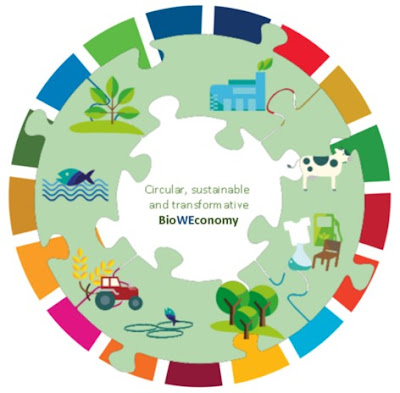BioWEconomy – New term is suggested for a transformative bioeconomy in which social aspects are of high importance
Type of post: OUTREACH.
The Network of Experts on Bioeconomy has synthesised knowledge from different sources in a new report to inform policymaking on the future transitions for a Bioeconomy towards Sustainable Development and a Climate-Neutral Economy. The report proposes a new term for a sustainable, circular and transformative bioeconomy in which social aspects are of high importance: BioWEconomy.
EU Science Hub update: “Developing a circular and sustainable bioeconomy for Europe: new report by the Network of Experts on Bioeconomy sets out the main opportunities and challenges ahead”, 19/11/2020.
New Report: “Future transitions for the Bioeconomy towards Sustainable Development and a Climate-Neutral Economy”.
Figure 1. The Network of Experts on Bioeconomy calls for a bolder transition towards a circular, sustainable and transformative BioWEconomy (taken from the new report)
The report is part of a forward-looking analysis promoted by the European Commission’s Knowledge Centre for Bioeconomy (KCB) to explore transitions towards a sustainable, clean and resource-efficient bioeconomy. In the report, the external experts reviewed and synthesised relevant knowledge and data on the current bioeconomy landscape and research & innovation developments, with a view to identifying key drivers and trends for a bioeconomy able to contribute to reaching the United Nations Sustainable Development Goals and EU climate objectives. As highlighted in the analysis, a circular and sustainable bioeconomy can be a core instrument for the European Green Deal in the post-COVID-19 era, making the EU more resilient and competitive.
Towards the BioWEconomy (selected quotations from the report)
“The guiding principle of being transformative is to acknowledge that various trade-offs and possible synergies are subject to societal decision making, which should not be guided by neoliberal economic logic alone: market aspects are one component of decision making, but not necessarily the dominant one.”
“In 2018, the book ‘WEconomy’ was published in the US (Kielburger, Branson & Kielburger 2018). In the same year, two Germans published a manifesto entitled ‘Economy to Weconomy’ (Marx & Stegfellner 2018), expanding the individualistic approach to a more societal and economic view. Inspired by these developments, the insertion of the ‘WE’ into the bioeconomy to form the term BioWEconomy is already a small transformation.”
“A circular, sustainable, and transformative BioWEconomy can mitigate several of the severe and likely risks, especially food and water crises, climate change, migration, and social instability. A circular, sustainable, and transformative EU BioWEconomy could become a role model for transforming other parts of the economy as well, helping to make the world a better and safer place for all.”
“The BioWEconomy reaches out to new sociocultural actors (collaborative/sharing economy, commoning), and explores innovation not only in technologies but also in business modes, and social practices.”





